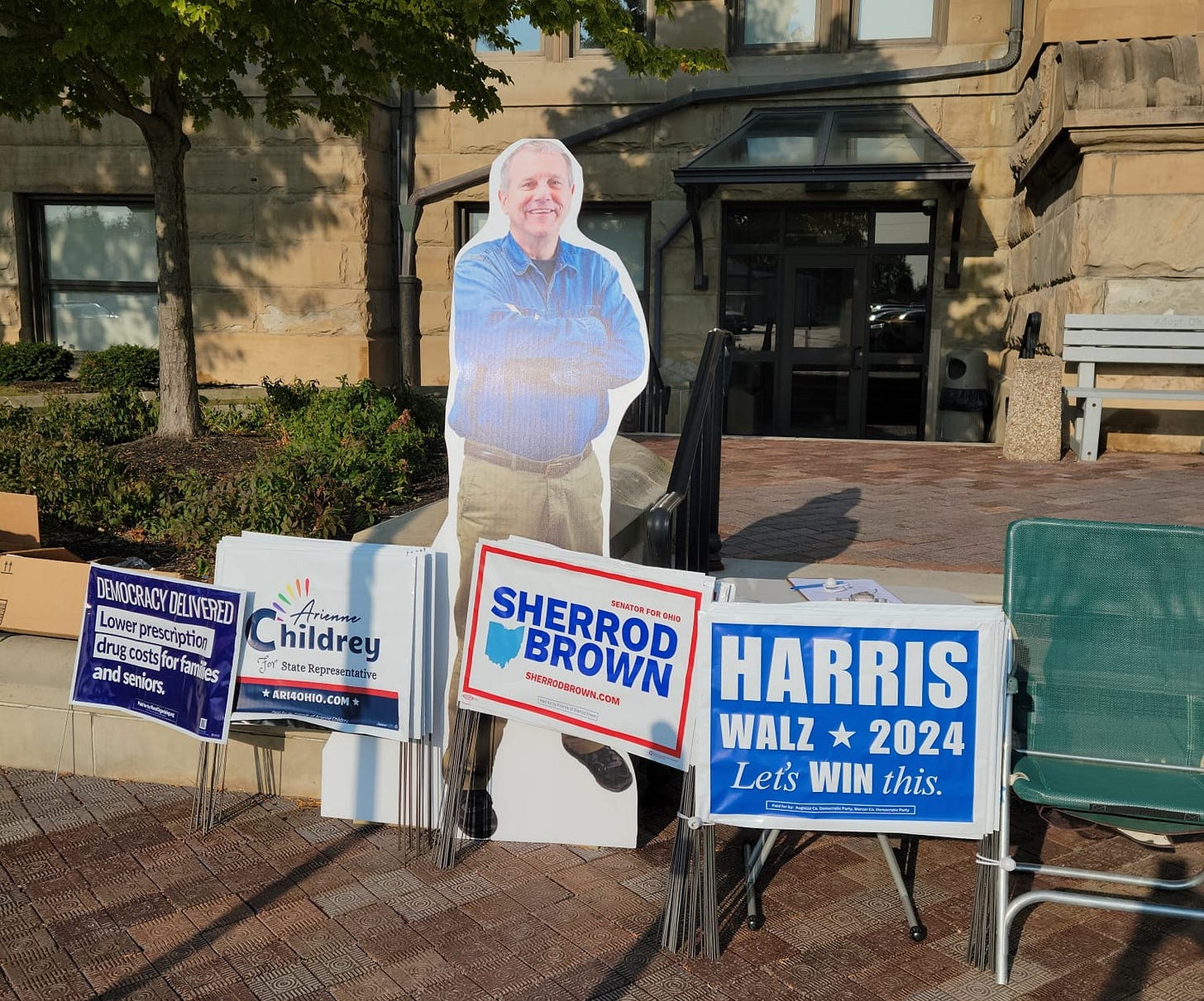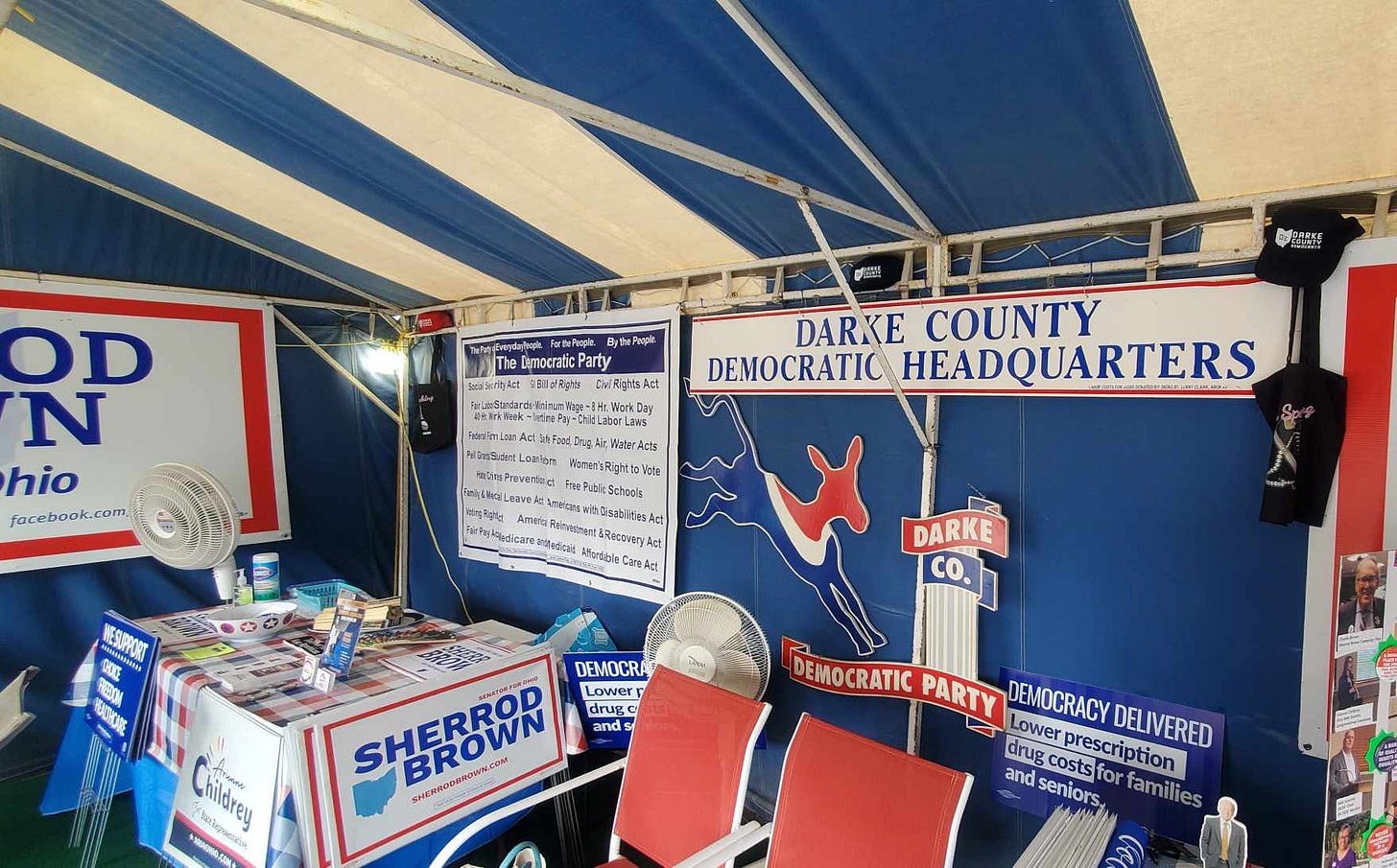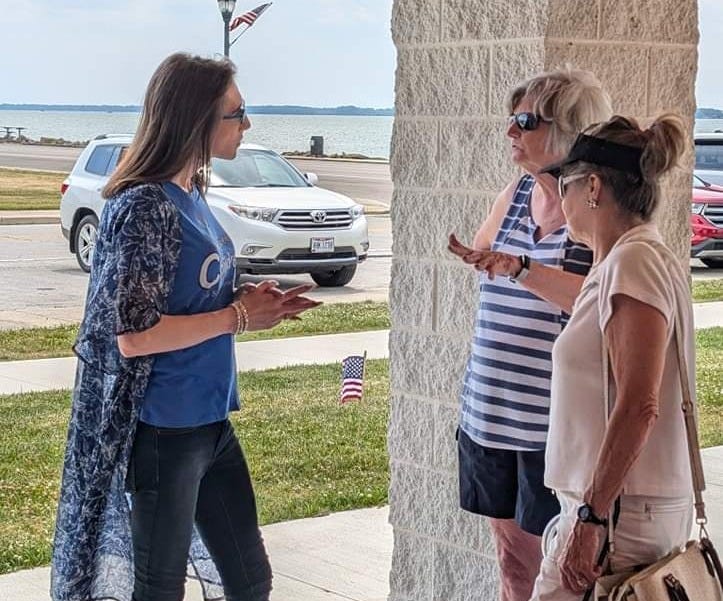As many of you know, I ran for the most red, solidly conservative district in the state of Ohio. Over the 422 days of the campaign, I held numerous public events, engaged in print and video media interviews, spoke at nearly anything that would have me, attended nearly every day of three county fairs, put out hundreds of yard signs, and six billboards.
The result of all that work was pretty close to what I expected: I got my ass handed to me. But the point is we ran the campaign to win, even as we knew the odds were extremely against us. Why bother? Because it was about so much more than winning. It was about standing up and, hopefully, giving others the courage to do likewise. It was about understanding that Democrats didn’t lose rural areas overnight, and we aren’t likely to get them back overnight either. It’s about moving the margin, even if it’s just a few voters at a time, and not being afraid to lose.
Admittedly, that can be a hard sell when trying to get others to stand up, speak out, and, most importantly, run Democratic candidates for every race, in every district. So let’s talk about why this work is so important, even without the immediate satisfaction of sending elected Democrats to the statehouse.
The Heart of Democracy: Competition
Let’s start with a very basic fact: Democracy thrives on competition. In fact, uncontested races rob voters of the opportunity to engage in the democratic process. Far too often, especially in red areas, Democrats have either been demoralized by past losses or scared into submission by extremism. Both of these perpetuate the status quo of those areas.
Over time, as voters see and hear nothing from Democrats, it becomes easier for them to become enveloped in the Republican echo chamber. They don’t see Democrats running, they don’t hear them pitch their policies or values, and rank-and-file Democrats are so deeply in the closet that voters assume they don’t exist in their area.
One story comes to mind, even though I feel certain it was partly trolling. During the campaign, I had the opportunity to work a couple of days with the Auglaize County Democrats as they set up in front of the courthouse. Each weekend, the county had a farmers’ market right across the street. The Auglaize Dems set up right across from them with yard signs and literature for the various candidates. One day we had a rather irritating and rude lady walk up to us, damn near giddy, because she said she didn’t know we even had Democrats in the area.
I’d love to tell you the encounter went well—it didn’t—but regardless, she met some Democrats and now knows that people in her own community, people who live just like her, shop at the same stores, have families that attend the same schools, have different views than what she’s been taught are near universal in our area.
When they don’t see us, don’t talk to us, and don’t interact with us, it becomes very easy to believe lies about us. They have Fox News, Newsmax, and their crazy uncle telling them we’re the most vile, blood-drinking, reptilian creatures on the planet. Meeting and talking to us may not break all those biases, but it’s a start. When you start breaking down those misconceptions, it leads them to reconsider their own positions and actually hear our position from us. They get to hear from us rather than merely about us—and, trust me, on your worst day, you’ll communicate the Democratic message better than any Fox News host.
It’s not going to be the exciting landslide victory that you see on cable news. It’s going to be a slow chipping away. And even when we eventually win, it will likely be by the thinnest of margins—but it’s worth it.
The Power of Competition: Shaking Up the Incumbents
Another amazing thing about running Democrats in a red district is what it does to your opponent. Uncontested races allow the incumbent to collect donations, create a war chest, and never really have to make their case to the voters. As you engage and chip away, it forces Republicans to start engaging with voters, and it gives you the chance to give voice to the damage they cause. If you’re lucky, that will either cause them to change some of the more destructive positions or at least moderate them—but just like winning, it will take time. They aren’t going to bother until you’ve moved the needle enough for them to feel threatened.
Countering Polarization: Changing Minds One Voter at a Time
We touched on this a bit, but another key reason to run in red districts is to counter the polarization and change minds, one voter at a time. Being the underdog is not without its advantages. While a majority of voters may look down on Democratic candidates, they like the opportunity to voice their frustration—and you’re going to be a prime target for that. Sound more like a con than a pro? It’s not.
Yes, in districts like mine, they’ll yell at you, they’ll call you all sorts of names, but in the process, they reveal the lies they’ve been told—and that gives you a prime opportunity to flip the situation and tell them what you really stand for. Rather than putting out broad sound-bite-style messages, you get the advantage of knowing exactly what the voters are thinking, and it’ll help you better structure future conversations.
Another story: At one county fair, I had the opportunity to interact with a nominally Democratic pro-life individual. She was in agreement with Democrats on most policies, enough to at least make her sympathetic to our side, but she held to a pro-life view. Now, let me make it clear, I was a pro-choice candidate. In fact, my pro-choice endorsements were pretty expansive. I didn’t try to play as if I’m anything other than pro-choice. I was honest with her about my stance of voting against any legislation that would weaken or take away the right to make one’s own decisions about a pregnancy, including abortion.
However, we talked about the root causes of abortion—such as poverty, lack of healthcare, the income gap, etc. I explained to her that my commitment to ensuring everyone had a choice meant I wanted them to have a fair choice. In other words, if someone was only considering abortion because they were poor, rather than taking away their choice, I wanted to address their poverty. Then, whether they chose abortion or carrying the pregnancy to term, they would have all the options before them.
I can’t tell you that it changed her mind, but as I explained how Democrats want to address root causes rather than taking away the decision-making power, she was much more amenable to the Democratic perspective. It turned out to be a very pleasant conversation, and she was able to see a pro-choice Democrat in a different light than when she stepped up. And most importantly, it was honest. I didn’t try to be all things to all people. I simply explained my position from a perspective she could understand.
The Power of Showing Up: Making a Difference One Election at a Time
Another important aspect is the power of simply showing up. Many red-district rural voters feel that Democrats don’t care about them, and that’s a hard argument to overcome if we don’t even care enough to run for office. It tells the voters that we’ve completely given up. Even if they don’t necessarily agree with what they believe we stand for, every Democrat that runs forges a path for the next Democrat, even if it’s for a completely different office.
One of the real ways that those local Democrats help progress is by speaking about the issues that really matter. The news that many red-district voters watch aren’t speaking about the political parties in the context of locally important issues. Major news networks focus on national issues, and they’re more than happy to make it as divisive as possible—after all, that makes for a ratings sweep.
That’s why it’s so easy for those voters to saddle Democrats with things like the Green New Deal or even the dishonest and dangerous rhetoric around transgender people. They aren’t hearing our ideas from us. They’re hearing a manipulated version from our opponents. As a local Democratic candidate, you have the perfect opportunity to speak on things that matter to your community. After all, they are the ones you’re asking to put you into office.
For most, this is going to be issues like their schools, their property taxes, concerns about taking care of their elderly parents, and how to keep their family-owned farm profitable and pass it along to the next generation. For the vast majority of rural voters, those are going to be the issues on their minds—they simply aren’t taking a critical look at Democrats because we aren’t there.
And even with those big issues, the more sensational ones that right-wing news likes to cover, you get to speak to them and explain them in a fair and sincere way. That makes them much less likely to fall for the caricatures of us found on Fox News, and it makes it easier for future candidates to speak up on those issues.
Building the Pipeline for Future Candidates
And that brings us to the most important reason you should run: those future candidates. Let’s be honest—it’s hard to convince people to run for office as a Democrat when they aren’t seeing others do likewise.
Our local county parties are small, many are scared, they don’t have a large pool of financial resources, and they may not even be comfortable with the attention a Democratic candidate running would bring to them. However, a Democratic candidate running can also help boost them. It can draw out closet Democrats who are ready to show support but need a sign that they’re not alone.
Most importantly, every candidate who runs lays a bit of groundwork for the next person who steps up. The more we do this, the more we will help our state become more representative of all Ohioans, not just those currently in power. We’re building a pipeline for Democrats who might not be ready today but will be tomorrow. We’re providing them the visibility, the encouragement, and the proof that they can make a difference. We’re helping to normalize the idea of Democrats not only in Ohio but in rural, red areas.
The Long-Term Impact: Moving Ohio Forward
Ultimately, running for office in a district like mine isn’t just about winning today. It’s about moving the needle and showing up for the people who need to see there are options. It’s about creating a culture where Democratic voices are heard in every district, even if they’re not in the majority right now.
Every conversation you have with a voter, every flyer you distribute, every speech you give, helps break down barriers and plant seeds for future victories. We may not always win elections right away, but we are shifting the political landscape for the better. Slowly but surely, we can build a more inclusive, more responsive Ohio where all voices are heard, regardless of party.
So, yes, I lost. But I ran. And I’ll keep running. Because the more of us who stand up, the more our democracy thrives. The more we invest in future candidates, the more likely it is that we’ll see the change we’ve all been working for.









